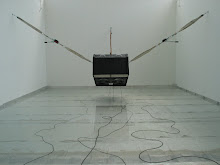Kapuscinski and tape-recorded memory
Ryszard Kapuscinski and friends, date and photographer unknown
The Lede, the news blog for The New York Times, reports that recent press coverage on a new biography devoted to Ryszard Kapuscinski got it all wrong, especially when they said the book accused the masterful Polish journalist and essayist of lying. Responding to questions from the NYT, the book's author, Artur Domoslawski, dismissed these reports as "completely wrong".
One statement in the ensuing interview intrigues:
"He never recorded interviews, but he did write notes – though usually he wrote them at night after a whole day’s work. He often said: if you don’t remember a detail or a fact, it means that it is not really important, it doesn’t matter.
So, all that relation between facts and fiction in his work is quite complicated. One of the reviewers of my book had an interesting observation: the picture of the forest that Kapuscinski shows us is generally correct and true, but in order to create that picture – true in its essence – Kapuscinski changed sometimes the position of some trees inside the forest.
Maybe there should be a separate category: neither fiction, nor nonfiction, but just shelf called “Kapuscinski.” I hope he would like the idea."
This last point seems a bit fanciful, but I do like the fact that Kapuscinski never recorded anything. The statement reminds me of a fragment from a 1974 Paris Review interview with WH Auden: "I think if there's anything worth retaining, the reporter ought to be able to remember it."
I must be a lazy journalist, reporter, hack, since I record most of my interviews. What I like about this strategy is the way it demystifies an encounter. Last year I interviewed a prominent photographer and left awed. "He is so eloquent," I told friends. When I transcribed the interview a month or so later – I had a long lead on this one – I was surprised at how, well, halting and ordinary his speech was. Count the conjunctions and repeated "you know" in this small fragment from the interview:
"You know, we all know what a refugee looks like: they cut the horizon at the waist and they’re bent over and they look hungry. You know, you can do that, and I’ve done that over the years and it’s repetitive, and I think photojournalism in general may suffer from that."
Perhaps this isn't germane to what Kapuscinski or Auden were talking about, but I like the fact that when you read verbatim transcripts of interviews with Miss Verb and Mister Person – a riff I have stolen from Sudanese-Ugandan poet Taban Lo Liyong – there is still this residue of the oral. Writing from memory often papers over this very basic fact.



0 Comments:
Post a Comment
Subscribe to Post Comments [Atom]
<< Home